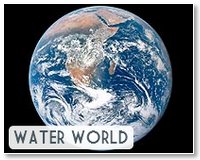 |
Beirut, Lebanon (UPI) Jan 21, 2011 Water scarcity in the Middle East can be the catalyst for reducing, rather than causing, conflict in the volatile region, a Beirut think tank says in a report that urges a major "paradigm shift" in how regional states view the problem of dwindling water resources. The report entitled "The Blue Peace: Rethinking Middle East Water," issued by the Carnegie Middle East Center, suggests that a radical "paradigm shift" is needed to change how these states view the political and environmental issues at the core of the water crisis, a region-wide approach rather than the piecemeal, largely bilateral, efforts made so far that have achieve almost nothing. "It is possible to anticipate conflict between countries due to disagreements over shared water resources," the report observed. "Indeed conventional thinking about water in the Middle East tends to be pessimistic and alarmist. "The challenge is to rethink water in the Middle East, to treat it as an opportunity for peace and development," the Carnegie Middle East Center declared. The report focuses primarily on Israel, the Palestinian Territories, Jordan, Lebanon, Syria, Iraq and Turkey, a choice "governed by the potential of opportunities to rethink water." The purpose is to develop "a common political framework for the future, for sustainable management of water resources across several basins and not a negotiating platform for dividing water resources in any individual basin or aquifer." The report, released Thursday in Beirut, envisions these states establishing a monitoring system through which they can collaborate and determine a more equitable sharing of water resources in the region. The report said river flows in Turkey, Syria, Iraq, Lebanon and Jordan have been depleted by 50-90 percent in the last half century. The flow of the Jordan River, a primary water source for five of these countries, has decreased 90 percent since 1960. "This is a serious problem," declared Sundeep Waslekar, president of the Strategic Foresight Group, which coordinated the report. With consumption rates expected to rise to 50-60 percent over the next decade, on top of a constant rise over the last 50 years, immense pressure will be on ever-shrinking supplies, he warned. Fadi Comair, a Lebanese who is president of the Mediterranean Network of River Basin Organizations, said that the "hydro-diplomacy" outlined in the report has the potential to reduce the risk of conflict between riparian states that is likely to increase, "especially in the Middle East." Lebanon and Syria have made moves to share water from the Orontes and Nahr al-Kabir rivers but Turkey and Israel have refused to sign on to an important U.N. convention on interstate rivers. A major dam-building program by Turkey has cut the flow of the Euphrates River through Syria and Iraq, where it runs to the Persian Gulf, causing serious cuts in water supplies in the downstream states. Five years of drought have intensified the problem. Climate change, the continued decline in rainfall and higher rates of evaporation due to rising temperatures indicate critical shortages in the not-so-distant future. The crisis is most acute in the Israeli-occupied Palestinian Territories, the report said. The Mountain Aquifer which feeds the West Bank has shrunk 7 percent since 1993, while the Western Galilee Aquifer is down 15-20 percent. As a result, calculations made during the 1993-94 Oslo Accords between the Palestinians and Israel and used in peace negotiations "need to be revised downward to provide a realistic formula for water-sharing between Israel and the future Palestinian state." Water appropriation has created a "high stress situation" where the average Palestinian exists on less than 30 liters of fresh water daily, Comair said. Lebanese and Jordanians get 60 a day. Israelis, who tap into the Palestinian aquifers, have 350 daily. "While short-term solutions will depend on the current political and environmental dynamics, medium-term and long-term solutions can be crafted, taking into account possibilities that may seem impossible today," the report concluded. "Relations between some of the countries in the broader region have undergone fundamental changes in the last two years. It would be naïve to assume that the political dynamics of 2011 will remain static until 2016 or 2021 "It would, therefore, be useful to consider strategies that are not trapped in the existing political and environmental prism."
Share This Article With Planet Earth
Related Links Water News - Science, Technology and Politics
 China earmarks $303 bn for safe water: report
China earmarks $303 bn for safe water: reportBeijing (AFP) Jan 21, 2011 China plans to invest $303 billion in water infrastructure projects over the next five years that would give millions of rural residents access to safe drinking water, state media reported. Severe flooding and droughts across the country last year destroyed crops and drove up food prices, pushing inflation to its highest level in more than two years, prompting the investment. Beijing wil ... read more |
|
| The content herein, unless otherwise known to be public domain, are Copyright 1995-2010 - SpaceDaily. AFP and UPI Wire Stories are copyright Agence France-Presse and United Press International. ESA Portal Reports are copyright European Space Agency. All NASA sourced material is public domain. Additional copyrights may apply in whole or part to other bona fide parties. Advertising does not imply endorsement,agreement or approval of any opinions, statements or information provided by SpaceDaily on any Web page published or hosted by SpaceDaily. Privacy Statement |